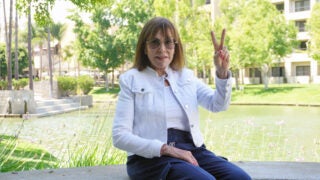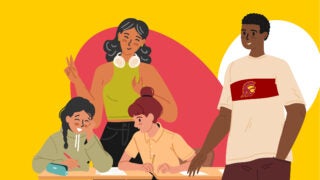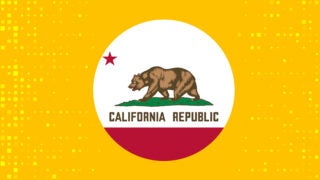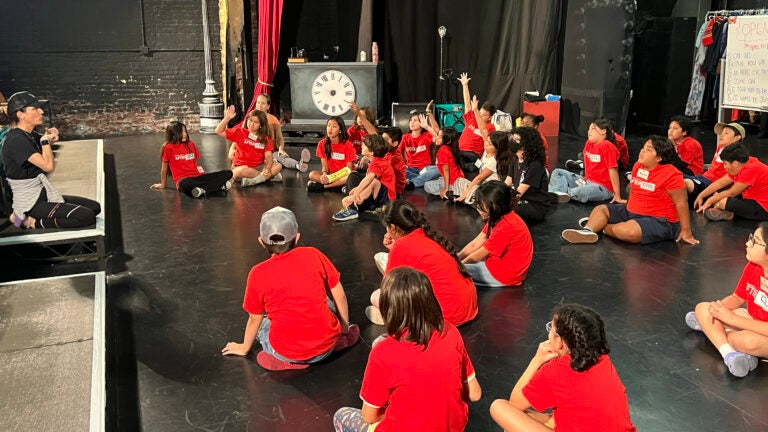
Teacher Melissa Booey leads an exercise in creating content through critical thinking and teamwork. (USC Photo/Greg Hernandez)
After Cool puts neighborhood kids center stage
For decades, local students have gained confidence and skills through the 24th Street Theatre program, which is supported by USC’s Good Neighbors Campaign.
There was some dramatic emoting taking place on the stage of the 24th Street Theatre on a recent Thursday afternoon, but not from professional actors.
A group of approximately 30 performers, made up of fourth and fifth graders in matching red T-shirts, were taking part in an exercise calling on them to use such phrases as “I told you to be careful” and “Oh no” to create an original scene with a partner. The exercise in creating content through critical thinking and teamwork was part of After Cool, a program held after school and offered to neighborhood students from second to eighth grade.
“It’s really magical and powerful,” teacher Melissa Booey told the group at the end of the two-hour class. “You all interpret things differently and are very brave with taking what’s in your imagination and putting it on the stage.”
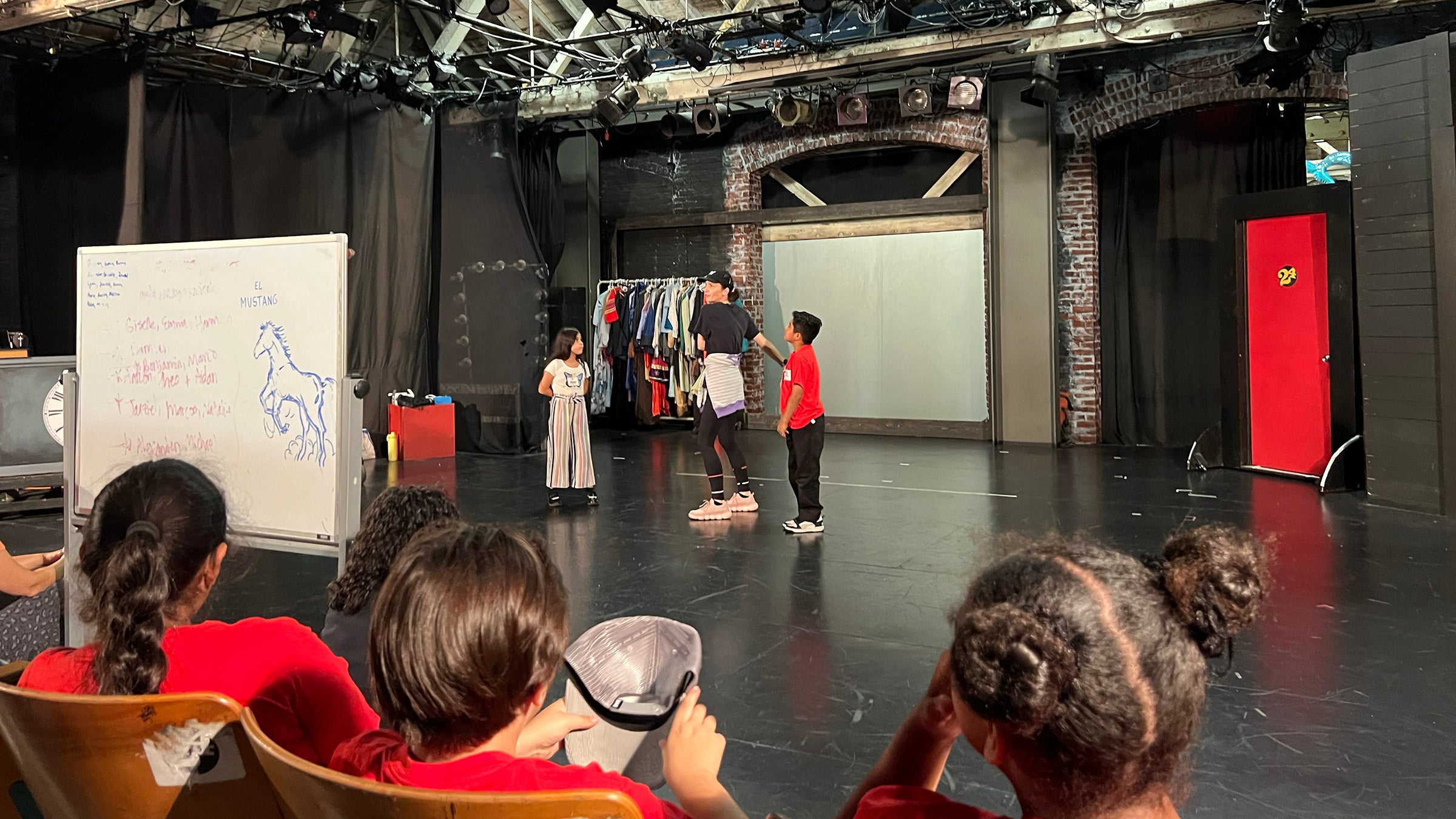
After Cool is one of several programs the theater offers to help meet the educational and social needs of the youth in the West Adams community just blocks from USC’s University Park Campus. The weekly, afterschool instruction is free. The goal of the program is to build students’ acting and creative skills through improvisation as well as character and story development. Along the way, the process helps participants develop confidence both on stage and in their daily lives.
“It’s really opening them up, not only to each other, but to themselves,” said USC School of Dramatic Arts senior El Belilty, who began working as an After Cool teaching assistant this fall. “They are learning to empathize, to communicate, to make friends and to be in an ensemble and take care of others.”
A longtime good neighbor
Nearly $10,000 of After Cool’s funding came from USC’s Good Neighbors Campaign, which awarded more than $1 million to 54 community organizations for the 2024-25 academic year. The campaign marks its 30th anniversary this year, and since its inception has awarded more than $30 million to community organizations near the University Park and Health Sciences campuses. Good Neighbors is largely funded by donations from USC faculty and staff.
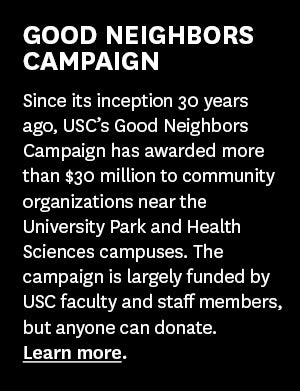 Because of the support of USC’s Good Neighbors program and several foundations, After Cool is able to serve 150 students each year at no cost. The After Cool curriculum is aligned with the California Content Standards for the Visual and Performing Arts.
Because of the support of USC’s Good Neighbors program and several foundations, After Cool is able to serve 150 students each year at no cost. The After Cool curriculum is aligned with the California Content Standards for the Visual and Performing Arts.
“For more than 20 years, inner-city kids have been getting to participate in After Cool for free because of USC and because of Good Neighbors,” said Jay McAdams, 24th Street Theatre executive director and co-founder. “We’re not just teaching them a 2,000-year-old art form. We’re teaching them how to look in somebody’s eyes: what character is. I think it is great for kids to have a place to go like this and to have positive role models.”
The 24th Street Theatre has had USC connections from the beginning: After Cool was launched a few years after the 99-seat theater opened its doors in 1997 with the encouragement of Robert R. Scales, then dean of the USC School of Dramatic Arts.
Scales, who died in 2019, was hoping to have a professional theater open in the USC area, and McAdams, artistic director Debbie Devine and other partners were searching for a permanent home for their various theatrical productions. Scales introduced the team to the building’s landlord and helped the theater get its first grant that enabled it to purchase stage lights and the theater’s seats, which were donated by the Herman Ostrow School of Dentistry of USC and still have small movable desks attached.
All program participants and their families are encouraged to attend the theater’s professional productions, which take place on the very stage where After Cool classes are held.
“We want them to see the professional work, the magnificence and maybe even make them cry,” McAdams said. “Then the next week, parents can see their kids on that same stage.”
Alumni paying it forward at After Cool program
Some of the program’s alumni have returned and joined the theater’s staff. Maria Erazo, who spent seven years as an After Cool kid, was hired to work in community engagement after she graduated from California State University, Los Angeles, more than a year ago.
“My mother signed me up for [After Cool] because I was really shy, and it made me more confident in myself,” Erazo said. “That’s what I want for these kids now. It’s social and emotional growth for them. I have parents tell me how their child is becoming much more expressive and can let them know how they’re feeling.”
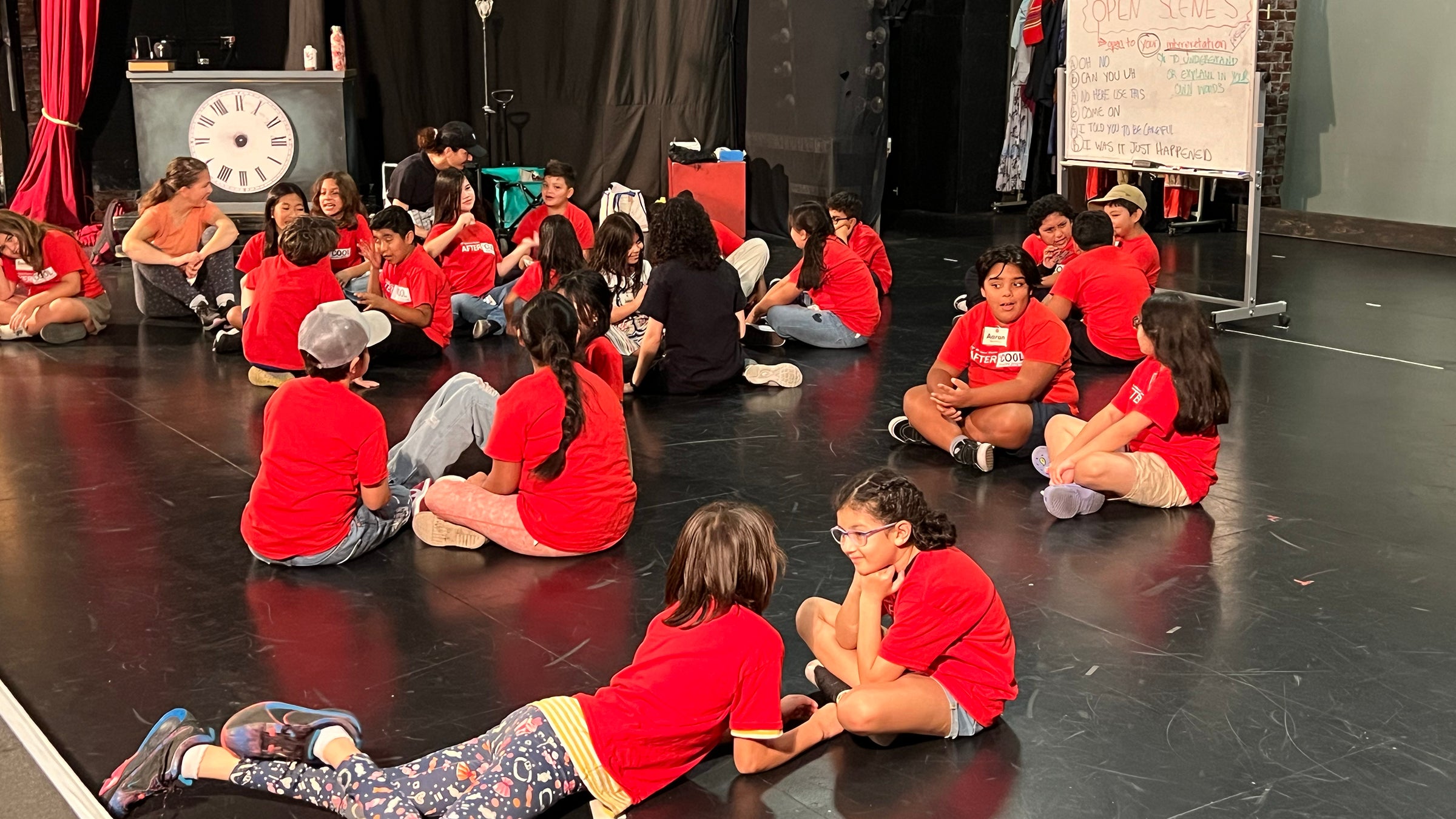
Hilario Flores, 17, recently became a part-time employee at the theater. He lives in the neighborhood and has been around the theater since he joined After Cool in second grade.
“It was a place where I could get away because at that time, I would be bullied at school,” Flores said. “This has been a place where I can be myself and have friends who understand me. I have also grown as a person.”
Teaching assistant Belilty is impressed by the commitment of the staff and their connection to the students.
“All of the teaching artists care so deeply about what they do,” she said. “It’s really inspiring to come every week and have this two-hour period with these kids and to see them be excited about being in a space where they get to explore new things. It’s really opening them up, not only to each other, but to themselves.”

